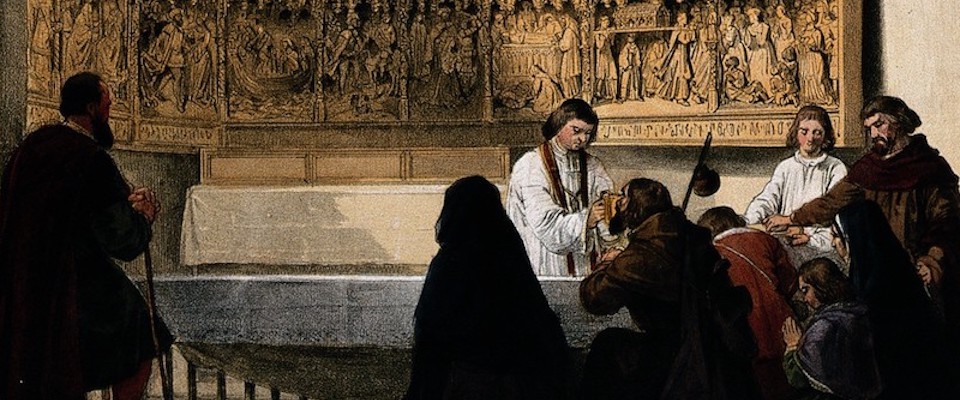Msgr. Charles Pope: “Strange but Rich Verses” File: What Does Acts 1:4 Mean by Saying that Jesus was Eating Salt with Them?

Paul VI’s Response to Margaret Sanger’s Sexual Revolution
July 26, 2018
Cal Thomas: The Seduction of Socialism
July 26, 2018
By Msgr. Charles Pope • July 25, 2018
There is an unusual verse that occurs in the first chapter of the Acts of the Apostles, describing a gathering of Jesus and the apostles after the resurrection but before the ascension. For the most part, modern translations do not reveal the full oddity of the verse. The verse in question, as rendered by the Revised Standard Version Catholic Edition, is this:
And while staying with them he charged them not to depart from Jerusalem, but to wait for the promise of the Father (Acts 1:4).
However, a number of scripture scholars, including none other than Joseph Ratzinger, point out that the verse is more literally translated as follows:
And while eating salt with them he charged them not to depart from Jerusalem, but to wait for the promise of the Father.
The Exhaustive Concordance of the Bible, better known as Strong’s Concordance,makes no mention of the connection of the word συναλιζόμενος (synalizomenos) to salt. It parses the word as syn (with) + halizo (to throng or accumulate) to arrive at the definition “to assemble together.”
However, another source, A Grammatical Analysis of the Greek New Testament(Pontifical Biblical Institute), includes a different analysis of the word: syn (with) + halas(salt), to arrive at the definition “to take salt together” or by extension, “to share a meal.”
So, there seem to be two rather different notions of the etymology. It is also interesting that none of the writings of the Greek Fathers that I was able to consult make any mention of the possible connection to salt, though St. John Chrysostom does connect the word to a meal rather than a mere gathering.
I know just enough Greek to be dangerous; I certainly cannot sort out why different sources parse the word differently, but for our purposes let’s just chalk it up to a difference among experts, much as is the case with another passage on which I have written here: Agapas vs. Philo.
I would like to explore the translation that the Lord was “eating salt with them.” How odd to our modern ears, especially when the “food police” today treat salt almost as a poison! Despite that, salt is still precious today, even if less necessary than it was in the ancient world.
Let’s consider what Pope Emeritus Benedict wrote (as Joseph Ratzinger):
For a correct understanding … the word used by Luke—synalizómenos—is of great significance. Literally translated, it means “eating salt with them.” Luke must have chosen the word quite deliberately. Yet what is it supposed to mean? In the Old Testament the enjoyment of bread and salt, or of salt alone, served to establish lasting covenants (cf Num 18:19, 2 Chron 13:5). Salt is regarded as a guarantee of durability. It is a remedy against putrefaction, against the corruption that pertains to the nature of death. To eat is always to hold death at bay—it is a way of preserving life. The “eating of salt” by Jesus after the Resurrection, which we therefore encounter as a sign of new and everlasting life, points to the Lord’s new banquet with his followers … it has an inner association with the Last Supper, when the Lord established the New Covenant. So the mysterious cipher of eating salt expresses an inner bond between the [Last Supper] and the risen Lord’s new table fellowship; he gives himself to his followers as food and thus makes them sharers in his life, in life itself … the Lord is drawing the disciples into a New Covenant-fellowship with him … he is giving them a share in the real life, making them truly alive and slating their lives through participation in his Passion, the purifying power of his suffering (Jesus of Nazareth Vol. 2, pp. 271-272).
So indeed, salt and covenants are tied. Here are a few verses that make the connection:
-
Whatever is set aside from the holy offerings the Israelites present to the Lord I give to you and your sons and daughters as your perpetual share. It is an everlasting covenant of salt before the Lord for both you and your offspring (Numbers 18:19).
-
Don’t you know that the Lord, the God of Israel, has given the kingship of Israel to David and his descendants forever by a covenant of salt? (2 Chronicles 13:5)
-
Season all your grain offerings with salt. Do not leave the salt of the covenant of your God out of your grain offerings; add salt to all your offerings (Leviticus 2:13).
It makes sense that Luke would refer to Jesus as eating salt with the disciples. To untrained ears it may seem odd, but to ears tuned to the biblical world the reference has great significance. Jesus is affirming the New Covenant and this expression points to that.
Of course, it is no mere table fellowship; it is the meal of the New Covenant we have come to call the Mass. Hence, without doing disservice to Luke’s description, we can say (in our more developed theological language) that during the forty days before He ascended, the Lord celebrated Mass with them. Thus, the Emmaus description (Luke 24:30) of Jesus at the table giving thanks, blessing the bread, breaking it, and giving it to them so that they recognize Him therein, is not the only allusion to a post-resurrection Mass.
Is it “Eating salt with them” or “Staying with them”? You decide, but I vote for salt. 😉
http://blog.adw.org/2018/07/strange-rich-verses-file-acts-14-mean-saying-jesus-eating-salt/




